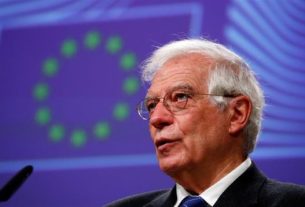President Donald Trump said Tuesday he was “not thrilled” about Israel’s stunning decision to strike Hamas officials on Qatari soil — a dramatic expansion of the war that has shaken the region, threatened Washington’s diplomacy, and rattled one of America’s closest Gulf allies, according to BBC News.
The unprecedented air raid in Doha, carried out by 15 Israeli fighter jets, targeted what Israel described as senior Hamas leaders responsible for organizing the October 7, 2023 massacre in southern Israel. The attack, according to witnesses, rocked the capital’s northern Katara district with as many as eight explosions, sending smoke plumes above residential compounds where Hamas’s political bureau has lived for more than a decade.
Qatari authorities said the blasts struck housing used by Hamas figures and confirmed the death of one officer from the country’s Internal Security Force, with several others injured. Hamas claimed five of its members were killed, including the son of senior negotiator Khalil al-Hayya, but insisted its Doha-based negotiating team had survived.
Washington Uneasy
Qatar, host to the largest U.S. air base in the Middle East and a key mediator in ceasefire talks, denounced the strike as a “cowardly act” and “a flagrant violation of international law.”
The White House — caught between its ally Israel and its Gulf partner — issued an unusually sharp rebuke. Press Secretary Karoline Leavitt said Israel’s unilateral bombing “does not advance Israel or America’s goals,” even while acknowledging Hamas’s responsibility for Gaza’s suffering. She added that Trump had ordered envoy Steve Witkoff to warn Qatari leaders just before the strike, and later personally assured Qatar’s emir that “such a thing will not happen again on their soil.”
Asked about Israel’s action, Trump told reporters: “I’m not thrilled… I’m not thrilled about the whole situation. It’s not a good situation. We want the hostages back, but we are not thrilled about the way that went down today.”
Israel Defiant
Prime Minister Benjamin Netanyahu defended the mission as “fully justified,” saying the Hamas leaders targeted were “the same men who initiated the October 7 massacre and who have continued to orchestrate murderous attacks ever since.”
Israeli security services said the operation followed fresh assaults in Jerusalem and Gaza that killed ten Israelis. Defense Minister Israel Katz had warned only a day earlier that Hamas leaders abroad would be “annihilated” if the group failed to surrender hostages.
Israeli media reported the strike involved a rapid volley of ten munitions on a single target. An official said it aimed at al-Hayya, Hamas’s chief negotiator, and Zaher Jabarin, the group’s exiled West Bank commander. Hamas, in turn, accused Israel of trying to sabotage ongoing negotiations, declaring: “Targeting the delegation while they discussed President Trump’s latest proposal confirms Netanyahu seeks to destroy all chances of agreement.”
Diplomatic Outcry
Reactions were swift and severe. Saudi Arabia condemned “brutal aggression.” UN Secretary-General António Guterres said Israel had committed “a flagrant violation of the sovereignty and territorial integrity of Qatar,” a nation he praised for “playing a positive role in efforts to reach a ceasefire and free hostages.” French President Emmanuel Macron called the raid “unacceptable regardless of motive,” while Britain’s Prime Minister Keir Starmer warned of “further escalation across the region.”
Pope Leo XIV told reporters the situation had become “very serious.”
Hostage Families in Anguish
For families of the 48 hostages still held in Gaza — roughly 20 believed alive — the news deepened despair. “I am shaking with fear,” wrote Einav Zangauker, whose son Matan remains captive. “It could be that in these very moments the prime minister has actually assassinated my Matan.”
Opposition leader Yair Lapid demanded answers from the government. “Hamas members deserve death,” he said. “But the government must explain how this operation does not jeopardize hostages’ lives, and whether that risk was considered.”
A Fragile Proposal
The strike came as Hamas negotiators in Doha were weighing a new U.S. proposal: a 60-day truce, with hostages released in the first 48 hours in exchange for Palestinian prisoners, followed by talks toward a permanent ceasefire. Trump had already declared that Israel accepted the terms and warned Hamas it faced a “last chance.”
Speaking later at the U.S. Embassy in Jerusalem, Netanyahu suggested the raid itself might hasten peace. “Israel has accepted the U.S. plan,” he said, urging Gaza’s residents to “stand up for your rights and your future. Make peace with us.”
War’s Grim Toll
The Gaza conflict began when Hamas gunmen stormed southern Israel on October 7, 2023, killing 1,200 people and abducting 251. Israel’s retaliation has since killed at least 64,605 people, according to Gaza’s Hamas-run health ministry.
Over 23 months of fighting, Israel has eliminated much of Hamas’s senior leadership — including exiled chief Ismail Haniyeh in Tehran last July and Yahya Sinwar, mastermind of the October 7 assault, in Gaza this past October.
Still, Tuesday’s strike marked a turning point: the first time Israel has struck Hamas targets inside Qatar, a wealthy U.S. partner long seen as essential to regional diplomacy. For Washington, it underscored the fragile line between supporting Israel’s war aims and preserving a balance of alliances that keep the Gulf — and America’s foothold there — stable.





